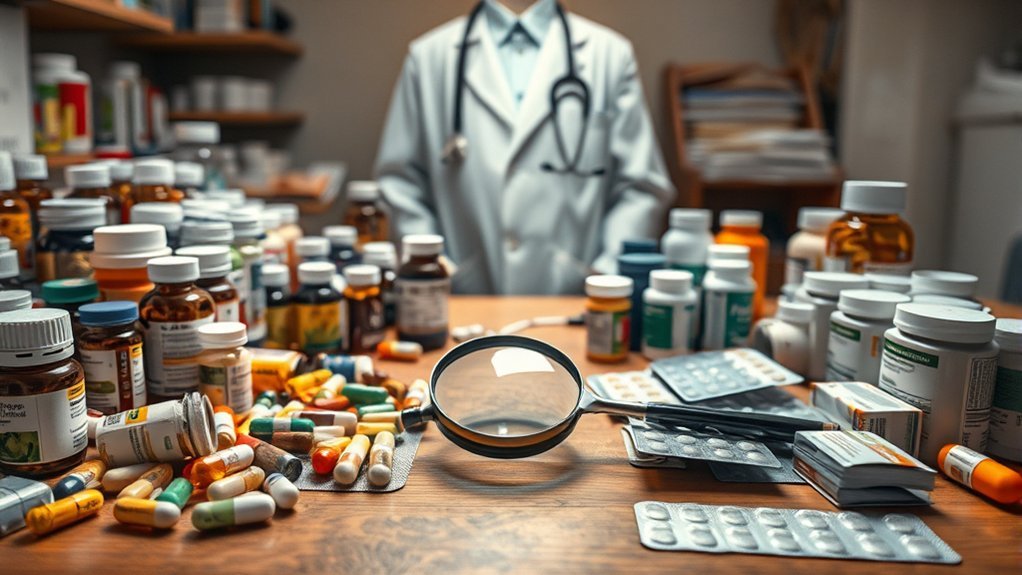When it comes to safe medications, many people hold onto myths that can skew their understanding. For instance, you might think that over-the-counter drugs are risk-free simply because they don’t need a prescription. However, this isn’t always the case. Exploring these misconceptions is essential for making informed choices about your health. What other myths might be influencing your decisions about medications?
Understanding Prescription Medications

Prescription medications play an important role in managing various health conditions, but understanding them is essential for safety and effectiveness. You need to recognize that these medications are tailored to treat specific ailments, and their usage must align with medical guidance.
Always read the accompanying information to grasp dosage, side effects, and potential interactions with other drugs. It’s vital to adhere strictly to your healthcare provider’s instructions, as deviations can lead to ineffective treatment or adverse reactions.
Additionally, keep an open line of communication with your doctor about any concerns or changes in your health. This proactive approach not only enhances your treatment outcomes but also empowers you to take charge of your health journey effectively.
The Safety of Over-the-Counter Drugs

When it comes to over-the-counter (OTC) drugs, many people underestimate the potential risks and misunderstand their proper usage.
You might think that just because these medications are available without a prescription, they’re completely safe, but that’s not always true.
Understanding the guidelines for their use is essential to avoid harmful effects and guarantee effective treatment.
Misconceptions About OTC Safety
How safe are over-the-counter (OTC) medications really? Many people believe that because these drugs don’t require a prescription, they’re inherently safe. This misconception can lead to overuse or misuse.
You might think that OTC meds are harmless because they’re available in stores, but they can still cause side effects or interact dangerously with other medications. Just because they’re easily accessible doesn’t mean they’re risk-free.
For example, taking multiple products containing the same active ingredient can lead to overdose. Additionally, some individuals may assume that natural or herbal OTC options are always safe, which isn’t true.
Always remember that proper knowledge and caution are essential, even with OTC medications, to avoid potential health risks.
Proper Usage Guidelines
While many people assume that over-the-counter (OTC) medications are simple to use, understanding proper usage guidelines is essential for ensuring safety and effectiveness.
Always read the label carefully; it contains dosage instructions and potential side effects. Don’t exceed the recommended dose, as doing so can lead to serious health risks.
Be aware of interactions with other medications, including prescription drugs and supplements. Keep track of your symptoms—if they persist or worsen, consult a healthcare professional.
Additionally, be cautious with medications that contain multiple active ingredients; these can lead to unintentional overdosing.
Finally, store OTC drugs safely, away from children, and pay attention to expiration dates. Proper adherence to these guidelines can greatly enhance your safety when using OTC medications.
Natural Remedies vs. Pharmaceutical Options

When considering treatment options, it’s essential to weigh the effectiveness of natural remedies against pharmaceutical alternatives.
While natural remedies may seem appealing due to their perceived safety, they often lack the rigorous testing and regulation that pharmaceuticals undergo.
Understanding these differences can help you make informed choices about your health.
Effectiveness of Treatments
As you explore treatment options, it’s essential to understand the effectiveness of both natural remedies and pharmaceutical alternatives.
Natural remedies often boast anecdotal support but lack rigorous scientific validation. They may work well for minor ailments, but their efficacy can vary greatly among individuals.
On the other hand, pharmaceutical options undergo extensive testing to prove their effectiveness and are generally more reliable for treating serious conditions. They often target specific pathways in the body, leading to quicker and more consistent results.
However, the side effects of medications can be significant.
Ultimately, evaluating the effectiveness of treatments requires a careful examination of your specific health needs, considering both the benefits and limitations of each approach.
Safety and Regulations
Understanding the effectiveness of treatments naturally leads to a discussion about their safety and the regulations governing them. When it comes to pharmaceutical options, they undergo rigorous testing and approval processes by agencies like the FDA. This guarantees their efficacy and safety through controlled studies and standardized dosages.
In contrast, natural remedies often lack the same level of regulation, which can lead to inconsistencies in quality and potency. While many people view natural options as safer, it’s essential to recognize that “natural” doesn’t always equate to “safe.” You should always be cautious and informed, understanding that some natural remedies can interact with medications or cause side effects.
Balancing safety and effectiveness is key in your treatment choices.
The Role of Dosage in Medication Safety
Though many people might underestimate the importance of dosage in medication safety, it plays a critical role in guaranteeing effective treatment while minimizing the risk of adverse effects. Understanding the correct dosage is essential for both safety and efficacy.
- Dosage determines the therapeutic effect and can vary based on individual factors.
- Even slight changes in dosage can lead to significant differences in how a medication works.
- Overdosing or underdosing can both result in treatment failure or harmful reactions.
- Always consult healthcare professionals to tailor dosages to your specific needs.
Being vigilant about dosage guarantees you maximize the benefits of your medications while keeping potential risks at bay. Taking the right amount at the right time makes all the difference in your treatment journey.
Side Effects: Fact or Fiction?
When it comes to side effects, you might encounter many misconceptions that can cloud your understanding.
It’s vital to recognize that while some side effects are genuine risks, others may not affect everyone in the same way. Individual reactions to medications vary considerably, making it essential to weigh both the risks and benefits tailored to your specific situation.
Common Misconceptions Explained
How often have you heard that all medications come with severe side effects? This misconception can lead to unnecessary fear and hesitation when considering treatment options.
In reality, side effects vary widely among medications, and many are mild or nonexistent.
- Not every medication affects everyone the same way.
- Some side effects are rare or only occur in specific populations.
- Many medications have beneficial effects that outweigh potential risks.
- Consulting with a healthcare provider helps to understand individual responses.
Real Risks and Benefits
While it’s easy to focus solely on the potential side effects of medications, understanding the real risks and benefits is essential for informed decision-making. Each medication can impact individuals differently, and weighing these factors is imperative.
| Risks | Benefits |
|---|---|
| Possible side effects | Relief from symptoms |
| Drug interactions | Improved quality of life |
| Long-term effects | Disease management |
| Dependency potential | Preventive measures |
| Allergic reactions | Enhanced well-being |
Individual Reactions Matter
What makes individual reactions to medications so varied? These differences stem from multiple factors that influence how your body processes drugs. Genetics, for instance, plays a vital role in your response to medications. Additionally, your age and overall health markedly impact how you metabolize medications.
- Genetic Variability: Different genes influence drug metabolism and efficacy.
- Age Factors: Older adults may experience heightened sensitivity to certain medications.
- Pre-existing Conditions: Chronic illnesses can alter drug effectiveness and side effects.
- Drug Interactions: Concurrent medications can lead to unexpected reactions.
Understanding these individual factors helps demystify why some experience side effects while others don’t, reinforcing the importance of personalized medicine in ensuring safe medication use.
The Importance of Medication Interactions
Understanding medication interactions is fundamental for anyone managing multiple prescriptions or over-the-counter drugs, as these interactions can greatly impact your health.
When medications interact, they can alter each other’s effectiveness or increase the risk of side effects, making it essential to monitor what you take. For instance, combining certain antibiotics with blood thinners may heighten bleeding risks.
Additionally, some medications can compete for absorption in your body, leading to reduced efficacy. It’s critical to consult with healthcare providers about all medications and supplements you’re taking.
Myths About Generic Medications
Many people believe that generic medications are inferior to their brand-name counterparts, but this misconception can lead to unnecessary costs and missed opportunities for effective treatment.
Generic medications must meet the same rigorous standards set by the FDA, ensuring their safety and efficacy. Here are some key points to evaluate:
- Active Ingredients: Generic drugs contain the same active ingredients as brand-name versions.
- Quality Standards: Both generics and brand-name drugs are manufactured under strict regulations.
- Cost-Effectiveness: Generics are often considerably cheaper, making healthcare more accessible.
- Bioequivalence: Generic drugs must demonstrate bioequivalence, meaning they work the same in the body as their brand-name counterparts.
Understanding these facts can help you make informed choices about your medication options.
The Impact of Age on Medication Safety
As you age, your body’s metabolism and organ function can change considerably, affecting how medications are processed and absorbed. This means that the dosage you once took may no longer be appropriate.
For instance, kidney and liver functions often decline, leading to slower drug clearance. Consequently, you might experience heightened effects or increased side effects from standard doses.
Additionally, age can influence how medications interact with each other, increasing the risk of adverse reactions. It’s important to regularly review your medications with a healthcare provider, especially if you’re taking multiple prescriptions.
They can help adjust dosages or suggest alternatives to guarantee safety and efficacy as your body changes over time. Understanding these factors is vital for maintaining your health.
Misconceptions About Medication Adherence
Medication adherence often suffers from various misconceptions that can lead to serious health consequences. Understanding these myths is essential for effective treatment and management of health conditions.
Here are some common misconceptions:
- “I’ll be fine if I skip a dose.” Missing doses can lead to treatment failure or worsening symptoms.
- “Taking medication is only necessary when I feel sick.” Medications often work best when taken consistently, even when you feel well.
- “Natural remedies can replace prescribed medications.” Many natural alternatives lack scientific backing and may not provide adequate treatment.
- “Once I start, I’ll have to take it forever.” Many medications are temporary and may be adjusted based on your health status.
Addressing these misconceptions can enhance your adherence and overall health outcomes.
The Truth About Medication Expiration Dates
While it’s easy to assume that medications are ineffective after their expiration dates, the reality is more nuanced. Expiration dates indicate the manufacturer’s guarantee for full potency and safety, but many medications remain effective beyond these dates.
Studies show that some drugs can retain their potency for years, especially when stored properly. However, this doesn’t apply universally; certain medications, like antibiotics or injectable solutions, can degrade more quickly.
You should avoid using expired medications, particularly for serious conditions, as the risks may outweigh the benefits. Always consult a healthcare professional if you’re unsure about taking a medication past its expiration date. Staying informed helps guarantee your safety and the effectiveness of your treatment.
Frequently Asked Questions
Can I Take Multiple Medications Without Consulting a Doctor?
You shouldn’t take multiple medications without consulting a doctor. Combining drugs can lead to dangerous interactions and side effects. Always seek professional advice to guarantee your safety and the effectiveness of your treatment plan.
Are Herbal Supplements Safe to Use With Prescription Drugs?
Herbal supplements aren’t always safe with prescription drugs. They can interact unpredictably, affecting efficacy and increasing side effects. It’s essential to consult your healthcare provider before combining any herbal supplements with your medications for safety.
What Should I Do if I Miss a Dose?
If you miss a dose, take it as soon as you remember. If it’s almost time for your next dose, skip the missed one. Don’t double up; just stick to your regular schedule.
Can Lifestyle Changes Enhance Medication Effectiveness?
Lifestyle changes can supercharge your medication’s effectiveness. By adopting a balanced diet, regular exercise, and stress management techniques, you enhance absorption and overall health, making your treatment plan work like a charm.
Are There Medications That Are Safe for Pregnant Women?
Yes, some medications are safe for pregnant women, but it’s essential you consult your healthcare provider. They’ll guide you on effective options, weighing risks and benefits to guarantee both your and your baby’s well-being.
Conclusion
In traversing the world of medications, it’s essential to separate fact from fiction. While over-the-counter options and generics may seem harmless or inferior, they’re often misunderstood. Embracing the nuances of dosage, side effects, and age-related considerations can empower you to make informed choices. Remember, even the most benign-looking remedy deserves respect and careful consideration. By debunking these myths, you’re not just safeguarding your health—you’re also ensuring a more informed approach to your wellness journey.
